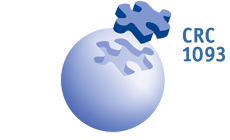CRC1093 Member Stefan Westermann
Molecular Genetics Research
Stefan Westermann studies how chromosomes interact with microtubules, highly dynamic polymers of the cytoskeleton. The carefully regulated interplay between chromosomes and microtubules, provided by large protein complexes termed kinetochores, is the fundamental basis for error-free propagation of the genome during cell division. He has started to collaborate with several CRC members, to employ supramolecular chemistry to both mimic and manipulate key aspects of kinetochore-microtubule interactions in vitro. As his group combines biochemical reconstitution experiments with direct observation of microtubules using fluorescence microscopy techniques, acute manipulations with tailored supramolecular ligands promise to reveal novel mechanisms of chromosome segregation.
Curriculum Vitae
Professional career
| 2015-today | Full Professor (W3) of Molecular Genetics, University of Duisburg-Essen |
| 2006-2015 | Independent Group leader, Research Institute of Molecular Pathology (IMP), Vienna, Austria |
| 2002-2006 | Postdoctoral work at the University of California, Berkeley, USA, with David Drubin and Georjana Barnes |
Scientific education and degrees
| 2015-today | Ph.D. at the Max-Planck Institute for Biophysical Chemistry, Göttingen, Germany, with Prof. Klaus Weber |
| 1992-1997 | Study of Biochemistry, University of Hannover, Germany, Diploma thesis with Prof. Klaus Weber |
Selected Publications
M. I. Molodtsov, C. Mieck, J. Dobbelaere, A. Dammermann, S. Westermann* and A. Vaziri*: A force-induced directional switch in a molecular motor enables parallel microtubule bundle formation. Cell. 2016, 167, pp 539-552. *co-corresponding authors
A. G. P. Altunkaya, F. Malvezzi, Z. Demianova, T. Zimniak, G. Litos, F. Weissmann, K. Mechtler, F. Herzog, and S. Westermann: CCAN assembly configures composite binding interfaces to promote cross-linking of Ndc80 complexes at the kinetochore. Current Biology. 2016, 26, pp. 2370-2378.
C. Mieck, M. I. Molodtsov, K. Drzewicka, B. van der Vaart, G. Litos, G. Schmauss, A. Vaziri and S. Westermann: Non-catalytic motor domains enable processive movement and functional diversification of the kinesin-14 Kar3. Elife, 2015, Jan27; 4.doi:10.7554/eLife.04489.
P. Hornung, P. Troc, F. Malvezzi, M. Maier, Z. Demianova, T. Zimniak, G. Litos, F. Lampert, A. Schleiffer, M. Brunner, K. Mechtler, F. Herzog, T. C. Marlovits and S. Westermann: A cooperative mechanism drives budding yeast kinetochore assembly downstream of CENP-A. J.Cell Biology. 2014, Aug 18; 206(4) 509–524 .
F. Malvezzi, G. Litos, A. Schleiffer, A. Heuck, T. Clausen and S. Westermann: A structural basis for kinetochore recruitment of the Ndc80 complex via two distinct centromere receptors, EMBO J. 2013, Feb 6;32(3):409-23.
F. Lampert, C. Mieck, G. Alushin, E. Nogales and S. Westermann: Molecular requirements for the formation of a kinetochore-microtubule interface by Dam1 and Ndc80 complexes, J. Cell Biology. 2013, Jan 7;200(1):21-30.
A. Schleiffer, M. Maier, G. Litos, P. Hornung, K.Mechtler and S. Westermann: CENP-T proteins are conserved centromere receptors of the Ndc80 complex. Nature Cell Biology. 2012, 14, 604-613.
T. Zimniak, V. Fitz, H. Zhou, F. Lampert, S. Opravil, K. Mechtler, P. Stolt-Bergner and S. Westermann: Spatio-temporal regulation of Ipl1/Aurora activity by direct Cdk1 phoshorylation. Current Biology. 2012, 22(9):787-793
F. Lampert, P. Hornung and S. Westermann: The Dam1 complex confers microtubule plus end tracking activity to the Ndc80 kinetochore complex. J. Cell Biology. 2010, 189 (4): 641-649.
E. Kiermaier, S. Woehrer, Y. Peng and S. Westermann: A Dam 1- based artificial kinetochore is sufficient to promote chromosome segregation in budding yeast. Nature Cell Biology. 2009, Sep;11(9):1109-15.



